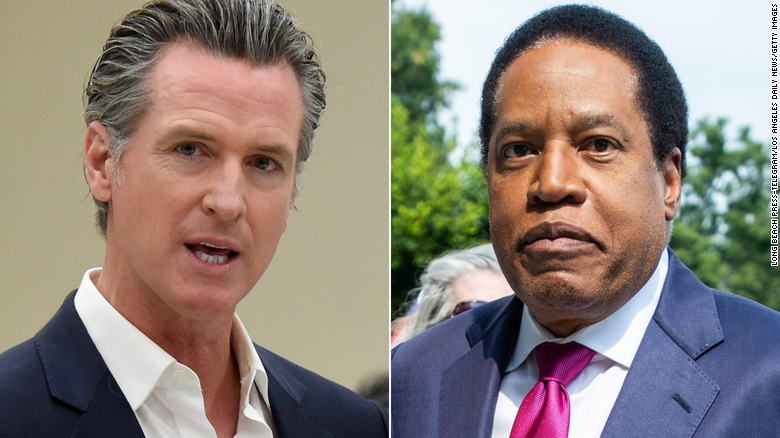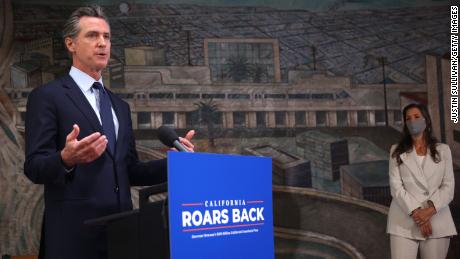(CNN)It's now less than two weeks until California's recall election, and the latest polling suggests good news for Gov. Gavin Newsom. Polls show that an increasing percentage of voters say they're going to vote "no" on the recall.
And while the polling average still suggests the possibility of the Democratic governor getting recalled, the chance that Newsom remains in office has increased significantly over the last few weeks.
The biggest poll published this week came from the Public Policy Institute of California. A clear majority of likely voters, 58%, said they were voting "no" on the recall. Just 39% indicated that they would vote to recall Newsom.
It's worth noting that the institute's poll does show Republicans making up 4 points more of likely voters than registered voters in the poll. A turnout advantage for Republicans matches with what we've seen historically in California for off-year elections with a Democratic president. The degree of any Republican turnout advantage does differ from election to election.
But given the more than 20-point Democratic registration advantage in the state over the GOP, Republicans likely need a larger turnout advantage than the poll is showing in order to recall Newsom.
It also should be noted that the institute's prior polls have tended to suggest a wider advantage for "no" on the recall than other polls.
Early vote data from Edison Research may point to a slightly larger turnout gap in the GOP's advantage relative to registration. About 5 million votes have already been cast (about 40% of the level in the last major off-year election, in 2018), and registered Democrats make up 53% of those ballots compared with 25% for Republicans. This is a 28-point gap between the parties. At this point in the 2020 cycle, the gap was closer to 35 points.
Other data does suggest a closer race. An average of all the data over the last few weeks suggests that race is closer to about a 10-point lead for "no" on the recall.
This too, however, is a shift from where the race was in the last half of July and first half of August. Back then, "no" on the recall averaged a lead of less than 5 points in the polls. This included a much-publicized CBS News/YouGov poll putting no ahead by 4 points among likely voters.
In other words, "no" on the recall's lead has doubled, even when looking at the average.
The average now looks a lot more like it did in the spring, when "no" sported a double-digit edge in the polls.
It's difficult to say why voters were more willing to recall Newsom over the middle of the summer. It might have been because Covid-19 cases were beginning an upswing in California, after falling rates during the spring. (That rise has mostly leveled off.) It could be because Democrats are rallying behind Newsom in this heavily Democratic state, as polls indicate he is gaining a larger share of the Democratic vote than he was previously.
It may have just been a polling artifact of what pollsters were conducting surveys, as the Public Policy Institute of California poll showed little change from earlier this year.
Whatever the case, the key factor of this race remains the same. Newsom is fairly well liked, and voters are unlikely to recall a governor they like.
The institute's poll showed him with a 53% approval rating among likely voters, compared with a 43% disapproval rating.
In fact, all of the reliable polling in this race so far has had Newsom's approval rating ahead of his disapproval rating.
Some prior polling, including the YouGov poll, seemed to suggest that Newsom would vastly underperform his approval rating/disapproval rating split. That's obviously possible, but it would be unusual.
Past elections indicate that governors either match or outperform their approval ratings in recalls.
Gray Davis, who was recalled in 2003, had an approval rating south of 30%. Newsom's approval rating looks similar to, if not a bit higher, than that of Wisconsin's Scott Walker when he fairly easily survived a recall in 2012.
Even so, there is the possibility that the race could tighten from what the polls show now.
Just look at what happened in the 2003 California recall. Polls taken with two weeks to go until that recall had the recall winning by an average of 19 points. The recall succeeded by only 10 points, a difference of 9 points of what the average had indicated with two weeks to go.
A Gallup poll of probable voters had the 2003 recall winning by 28 points at this point, which differed from the final margin by 18 points.
Chances are neither the polling average this year at this point or the Public Policy Institute of California poll will differ as much as the polling did in 2003.
Still, after what we've seen the last few election cycles, caution is not a bad thing when interpreting polling data.





